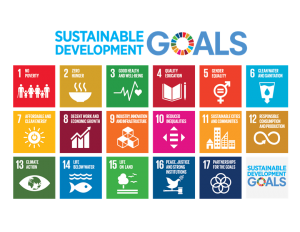Global S&T Development Trend Analysis Platform of Resources and Environment
| SDG Position Statement Affirms WEF’s Support for Working Beyond Borders | |
| admin | |
| 2019-08-29 | |
| 发布年 | 2019 |
| 语种 | 英语 |
| 国家 | 国际 |
| 领域 | 资源环境 |
| 正文(英文) | This summer, the Water Environment Federation (WEF; Alexandria, Va.) Board of Trustees unanimously approved a new position statement in support of the United Nation’s Sustainable Development Goals (SDGs). The move emphasizes WEF’s dedication to partnerships and activities that advance the SDGs and the broader water profession. It also recognizes water professionals’ critical value in achieving global gains for public health, the environment, and beyond.  The Water Environment Federation (Alexandria, Va.) Board of Trustees has unanimously approved a new position statement in support of the United Nations’ Sustainable Development Goals. Photo courtesy of the United Nations. “I am proud that the Board of Trustees has unanimously approved WEF’s support of the United Nations’ Sustainable Development Goals,” said 2018-2019 WEF President Thomas Kunetz. “WEF will do its part to help our members take action to achieve these goals.” The U.N. developed a set of 17 SDGs in 2015 with the aim to solve the world’s most difficult and pervasive problems – world hunger, environmental pollution, economic and social inequality, and more. The goals, each with their own set of targets and metrics, act as a roadmap that drives collaboration between member states as they attempt to address these global problems by 2030.
Supporting Your Work for Global GoodWater professionals play a direct role in meeting SDG 6, which calls for sustainable, universal access to water and sanitation. Some of the targets associated with SDG 6 include water-reuse volumes, reductions in untreated wastewater, and water-supply resilience, which WEF members help meet every day just by doing their jobs. However, moving the needle on SDG 6 requires coordination and awareness. WEF is uniquely positioned to support the water sector in its pursuit of the SDGs. As a membership organization, WEF has a history of advancing water-sector innovation, disseminating knowledge to those who need it most, and fostering a global community of empowered water professionals. Several WEF programs aim to ensure that the water sector continues to attract top-tier talent, while WEF publications and communications programs spread the word about its successes.
Working Toward Common GoalsWater professionals not only contribute to progress on SDG 6, but to nearly all the SDGs. Providing ample water for irrigation, for example, is crucial to ensure adequate food supplies and end world hunger (SDG 2). Effective wastewater treatment and responsible discharge regulations protect life below water (SDG 14) and life on land (SDG 15). By furthering access to water in places without reliable sources, water professionals can improve access to a better life for women and girls, who globally spend up to 40 billion hours each year securing water for their families (SDG 5). “It is important to understand that the SDGs are interrelated—achieving successes in clean water and sanitation, for example, helps achieve improvements in the SDGs related to poverty, hunger, health, and gender equality,” Kunetz said. (Read more from Kunetz on the importance of meeting SDG 6 in his latest From the President column.) And just as other nations can benefit from U.S. water-sector innovation, the U.S. also stands to prosper from collaboration. For example, WEF Trustee Peter Vanrolleghem described how international utility partnerships are leading to fundamental shifts in how Americans perceive resource recovery and eliminate waste. “Western nations have until 2030 to reflect on how we can improve the sustainability of our society, in the big and in the small,” Vanrolleghem said. “We have a long way to go and WEF’s adoption of a position statement on the SDGs is a powerful message that the time to take these goals seriously has come.” WEFTEC 2019 attendees can earn a self-reporting certificate for demonstrating their interest in meeting the SDGs. Attend three sessions marked with the SDG tag, record your attendance, and submit your form onsite at WEFTEC 2019. Consult the WEFTEC Conference Program for more details. |
| URL | 查看原文 |
| 来源平台 | Water Environment Federation |
| 文献类型 | 新闻 |
| 条目标识符 | http://119.78.100.173/C666/handle/2XK7JSWQ/134589 |
| 专题 | 资源环境科学 |
| 推荐引用方式 GB/T 7714 | admin. SDG Position Statement Affirms WEF’s Support for Working Beyond Borders. 2019. |
| 条目包含的文件 | 条目无相关文件。 | |||||
| 个性服务 |
| 推荐该条目 |
| 保存到收藏夹 |
| 查看访问统计 |
| 导出为Endnote文件 |
| 谷歌学术 |
| 谷歌学术中相似的文章 |
| [admin]的文章 |
| 百度学术 |
| 百度学术中相似的文章 |
| [admin]的文章 |
| 必应学术 |
| 必应学术中相似的文章 |
| [admin]的文章 |
| 相关权益政策 |
| 暂无数据 |
| 收藏/分享 |
除非特别说明,本系统中所有内容都受版权保护,并保留所有权利。
修改评论